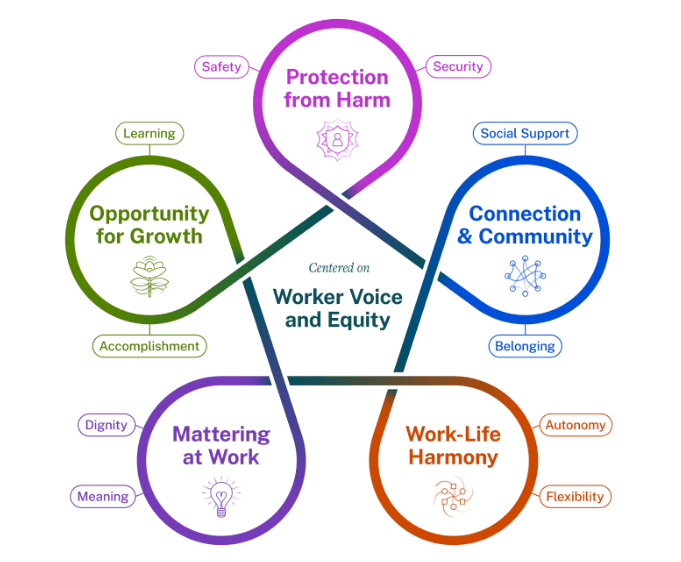The Office of U.S. Surgeon General Vivek Murthy MD, MBA published its Framework for Workplace Mental Health and Well-Being to guide employers in promoting worker mental health and well-being in the post-COVID era. In response to widespread “quiet quitting” and the Great Resignation, the Surgeon General’s framework for workplace mental health aims to ameliorate some of the major issues driving burnout and disengagement among America’s workers.
The framework is especially relevant to nurses because it touches on five topics that have been part of the growing national discourse around the state of the nursing profession. The five areas are:
- Protection from harm
- Connection and community
- Work-life harmony
- Mattering at work
- Opportunities for growth

With the ongoing nursing shortage caused by nurse attrition and retirement, coupled with a rising demand for nurses to care for an aging population, attracting more prospective nurses to the profession has become increasingly crucial. Yet it is difficult to do so when being a nurse often requires extreme sacrifices. Nurses are people, first and foremost, who should have the same rights and privileges as everyone else to work in a healthy environment that protects their well-being.
In this article, we’ll look at each of the areas in the framework and how they apply specifically to nurses. Leaders can use the framework to ensure that they are providing the best possible work environments for their nurses — and all their staff — to improve job satisfaction, employee productivity, and patient outcomes.
Protection from harm
As a baseline, all employees should be able to work without fearing for their personal safety. If there is a history of violence, the possibility of future harmful events, or a lack of adequate protection against threats of violence, uncertainty about physical safety can create an unhealthy work environment.
In addition to physical safety, the Surgeon General’s framework calls attention to psychological safety, which is defined as a work environment where staff members feel comfortable sharing their ideas and concerns, being themselves at work, and collaborating with coworkers.
For our 2024 Nurse Salary and Job Satisfaction Report, we surveyed over 3,600 nurses and found that both physical and mental workplace violence continue to be an issue for nurses. A majority (64%) if nurses reported verbal abuse by a patient or family member, and 23% had experienced physical abuse or assault by a patient or family member.
Of these, 12% of nurses in our survey reported weekly instances of workplace violence, and another 10% reported monthly instances. If healthcare organizations do not take measures to prevent these incidents from occurring, they risk deterring nurses from entering or staying in the profession.
Additional aspects of this topic are financial and job security, enabling adequate rest, normalizing mental health care, and operationalizing diversity, equity, inclusion, and accessibility throughout the workplace culture.
Connection and community
The second topic area of the Surgeon General’s framework for workplace mental health focuses on connection and community. It defines these attributes as positive social interactions and relationships that support well-being.
Efforts to improve these qualities involve holistic measures that span the entire organization, such as creating a culture of inclusion and belonging, cultivating trust, and fostering collaboration and teamwork within the workplace.
Nurses may perceive that some workplaces have these qualities, and some don’t — and they are more likely to leave those that don’t. Leaders should understand that these characteristics don’t happen by chance. Promoting a positive and supportive workplace culture requires intentionally implementing practices and policies that encourage and support these attributes.
On the plus side, successful organizations will see higher levels of engagement, innovation, and performance from their employees. They will also benefit from the added dimensions of innovation and creativity that research has shown occur when workplaces foster diversity and inclusion.
Work-life harmony
The third topic area of the Surgeon General’s framework for workplace mental health focuses on work-life harmony. This topic is about the need for employees to balance their professional and personal roles to avoid conflict and stress.
Exploring the human need for autonomy and flexibility, this topic area’s key components are employees’ ability to control how and when they do their work. Aspects include access to paid leave, clear boundaries between work and personal time, and job predictability.
The ability of nurses to have stable work lives contributes greatly to their physical and mental health and well-being — and by extension, their productivity and satisfaction. For healthcare organizations, work-life harmony is a key retention factor.
Nurses who don’t have work-life harmony for extended periods of time can develop compassion fatigue and burnout. In worst cases, lack of balance can exacerbate mental health issues such as depression and anxiety.
Mattering at work
The fourth topic area of the Surgeon General’s framework is “mattering at work,” which encompasses making a positive impact and believing in the meaning and purpose of your work. According to the framework, this topic also covers “dignity,” which the Surgeon General defines as “the sense of being respected and valued.”
Even though nursing has perennially ranked as one of the nation’s most respected professions, the wide variety of nursing roles and care settings can make some nursing jobs less ideal than others. Especially in situations when nurses don’t have the safety and respect that they (and all other employees) deserve, the feeling of mattering at work may be diminished.
Key aspects of this topic include earning fair and equitable wages and having sufficient benefits, such as health care, worker’s compensation, financial and legal services, and caregiving support.
Beyond the basics, mattering at work includes participation in workplace decisions, feeling engaged and empowered, belonging to a culture of gratitude, appreciation, and recognition, and connecting to an organizational mission. All these qualities help instill a sense of pride, fuel motivation, and enhance well-being.
Opportunity for growth
The fifth and final topic area of the Surgeon General’s framework is opportunity for growth. This topic highlights workers’ need for accomplishment in their professional lives. It is not conducive to fulfillment to let employees continue indefinitely without progression or advancement, as research has shown that employees need to grow to be happy.
Knowing that there are opportunities for learning and development can spur employees to set goals, strive for excellence, and accomplish more, both for themselves and their organizations. Opportunities provide a sense of optimism and enable workers to take pride in improving themselves.
As a provider of healthcare education and workforce enablement solutions, Relias provides quality learning and development for nurses, providers, and other healthcare professionals. We align with the Surgeon General’s recommendation that workplace leaders who provide training increase skills, build knowledge, and enhance performance.
As part of their efforts to support employee growth, the Surgeon General also recommends that employers provide mentoring and coaching resources, transparent and equitable career advancement, and relevant, two-way feedback for employees. Examples of recommended resources include training, career support, tuition reimbursement, and opportunities for promotion.

Nurse Salary and Job Satisfaction Report
Did you know that education is one of the top benefits that nurses want? Our 2024 Nurse Salary and Job Satisfaction Report, based on a survey Relias conducted of over 3,600 nurses, found that 18% of nurses listed continuing education as a benefit they wanted but did not receive. In fact, education was second on the top 10 benefits that nurses desired but did not receive. Learn what else nurses said they want by downloading our full report.
Download report →





